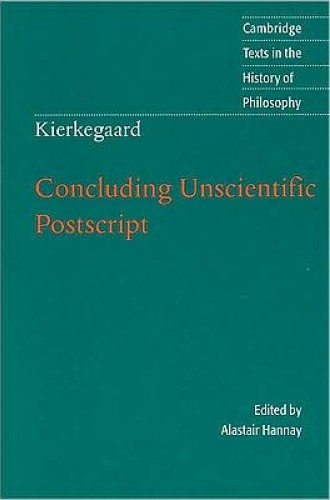Kierkegaard, edited and translated by Alastair Hannay
Many of the readers who flock to Søren Kierkegaard are members of the philosophy guild. The Kierkegaard book of choice for most of these aficionados is the ironically titled Concluding Unscientific Postscript. It is in this sprawling 500-plus-page addendum to the slim and taut Philosophical Fragments that the Danish Socrates tenders his critique of objectivity and makes his most tightly (though still obliquely) reasoned case that reason and knowledge can take us only so far in life—or at least in the life of the spirit.
Those attracted to Kierkegaard for his dialectical triple axels have long awaited a fresh translation of this marvel of a book, not because the earlier Swenson/Lowrie and Hong editions are inadequate—they are not—but because this is a maddeningly complicated text with many a nettlesome sentence. For non-Danish speakers and perhaps Danes as well, it always helps to have another take, especially when that take comes from Alastair Hannay, a renowned philosopher and translator who has lived and taught in Scandinavia for decades.
Read our latest issue or browse back issues.
As Hannay explains in his illuminating and exceptionally clear introduction, the Postscript was composed in 1845, during a period when (comic as it may seem) our highly neurotic, theological Mozart was contemplating retiring from the scribbling life to seek a post as pastor in a rural church. By this time the 32-year-old Kierkegaard had already authored numerous works, including Stages on Life's Way and Edifying Discourses. For reasons that it would take a Freud to fathom, Kierkegaard was firmly convinced that he would not live beyond his 33rd year, so he sought to capture the entire teeming jungle of his thought between the hard covers of the Postscript.
In addition, there was Kierkegaard's media battle with the popular Danish rag the Corsair. After receiving a mildly critical review of his Stages on Life's Way, the always umbrageous Kierkegaard reacted with a personal attack on the reviewer and the journal. The Corsair responded in kind, and so began a series of literary strikes and counterstrikes that went on for months. While this public battle took an immense toll on Kierkegaard, it also helped to convince him to relinquish the fantasy of packing away his desk; thus the Postscript, published in February 1846, was by no means concluding. Works of Love, The Sickness unto Death, Practice in Christianity and a number of religious discourses were all post-Postscript.
Part and parcel of Kierkegaard's theory and practice of communication was his habit of composing his classic texts under pseudonyms. Both the Fragments (or Crumbs, as Hannay prefers) and the Postscript were written under the nom de plume Johannes Climacus, Kierkegaard's philosophical persona. It is easy to see the philosophical muscle rippling through this sometimes downright hilarious study.
In Philosophical Fragments, the prelude to the Postscript, Kierkegaard's authorial alter ego asks, "Can there be a historical point of departure for an eternal consciousness; how can such a thing be of more than historical interest; can one base an eternal consciousness on historical knowledge?" In the Postscript itself, Kierkegaard takes up the problem in its historical garb—as in, can Christianity provide a basis for an eternal consciousness? After all, it is Christianity alone that founds individual salvation on a historical event.
There are myriad important themes threading through this meditation on what it means to be a Christian. Kierkegaard addresses the relation between faith and reason, the ethico-religious significance of humor and irony, the relation between mood and thought, the proper mode of communication for existentially significant truths, the importance of passion, the different levels of religiosity and so on. But the pages that are always dog-eared are those tracing out the distinction Kierkegaard deftly draws between objective and subjective thinking, and the connection he works out between developing faith and nurturing subjectivity.
Just listen to this salvo that opens part two:
While objective thought is indifferent to the thinking subject and his existence, the subjective thinker is, as existing, essentially interested in his own thinking, is existing in it. Therefore, his thinking has a different kind of reflection, namely the reflection of inwardness, of possession, by virtue of which it belongs to the subject and no other.
A few pages earlier came a shot across the bow for all who seek to turn science and faith into bedfellows:
The more objective the world and subjectivities become, the more difficult it is with religious categories, just because they belong within subjectivity, which is why wanting to be . . . scientific, objective in relation to the religious is well-nigh an excess of irreligion.
Read: if faith were a matter of knowledge—of science—we would not need faith.
In a brace of sentences that have perhaps been parsed more than any others from the Postscript, Kierkegaard writes:
If someone living in the midst of Christianity enters the house of God, the house of the true God, knowing the true conception of God, and now prays untruly, and if someone lives in an idolatrous land but prays with all the passion of the infinite, although his eyes rest upon the image of an idol—where then is there more truth? The one prays truly to God though he worships an idol; the other prays untruly to the true God, and therefore worships an idol.
The message is, I think, plain: there is more truth in the inward and passionate individual who prays truly.
According to the less than objective offering that is the Postscript, the objectivity often associated with fairness and the triumph of reason is a form of disinterestedness that is appropriate in some areas, but not when it comes to matters of essential truth—of faith and morals. Subjectivity is a kind of unselfish self-concern, and to the extent that the modern age encourages us to suppress that inner relation, it invites spiritual suicide.
In this philosophical and theological cornucopia of a book, Kierkegaard's Climacus remarks that he picked up his pen with the odd intention of making life more difficult for his readers. Perhaps by this he meant that he aimed to provide a corrective to his times and portray the ethical and religious life in all its radical austerity. With the publication of this volume, Hannay has certainly made it easier for Kierkegaard to make our lives more difficult.






